SFRR-E Official Journals
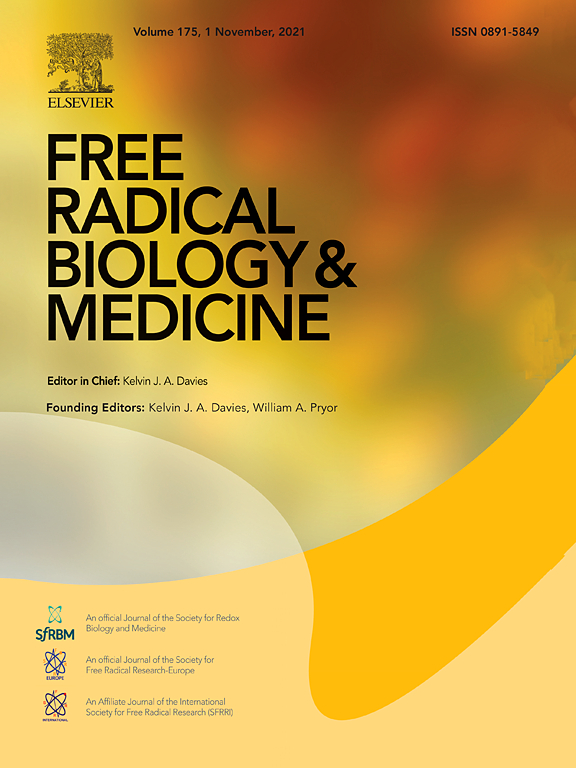
Free Radical Biology and Medicine
2024 Impact Factor: 8.2
2024 Cite Score: 13.6
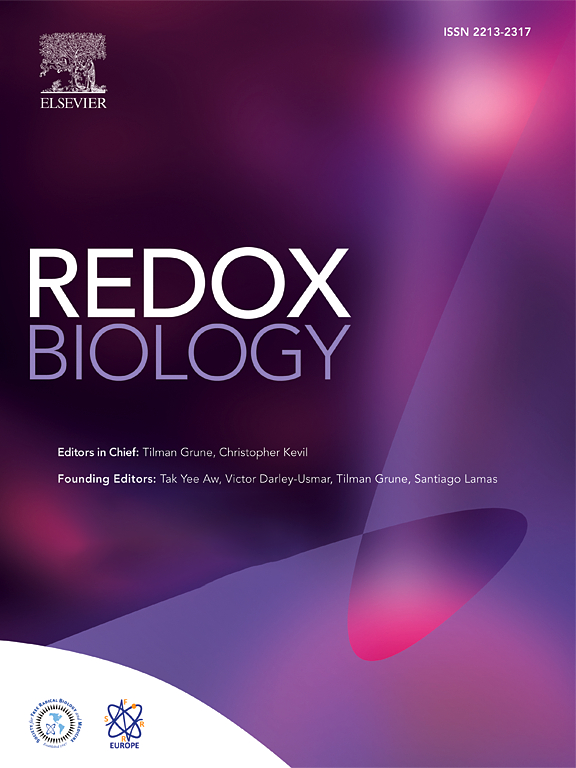
Redox Biology
2024 Impact Factor: 11.9
2024 Cite Score: 19.5
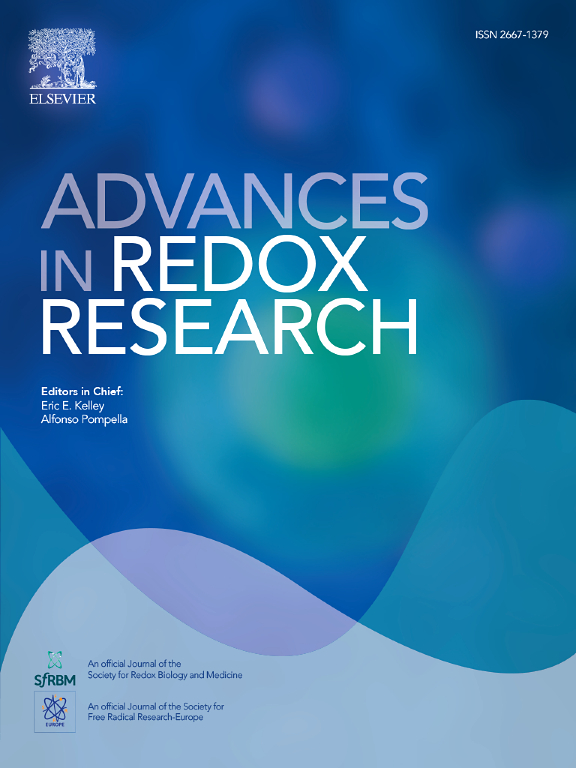
Advances in Redox Research
2024 Impact Factor: 2.7
2024 Cite Score: 4.3
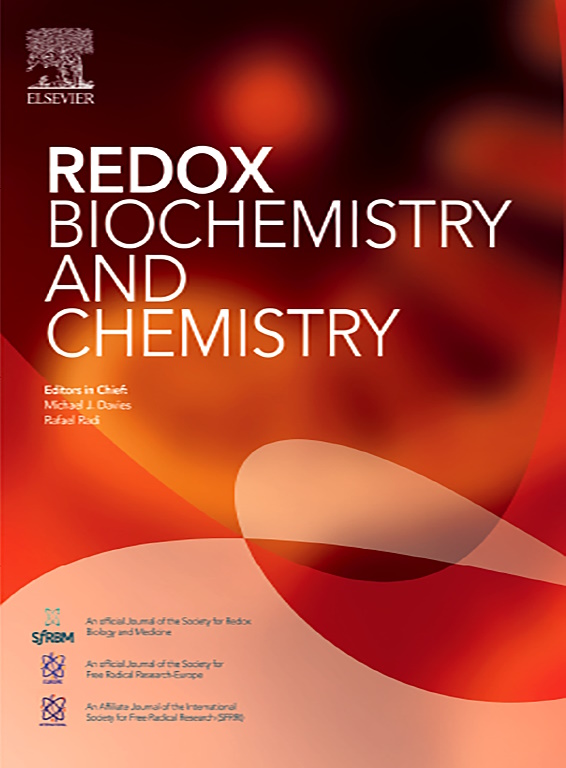
Redox Biochemistry and Chemistry
No metrics as of yet
.
Free Radical Biology and Medicine (FRBM)
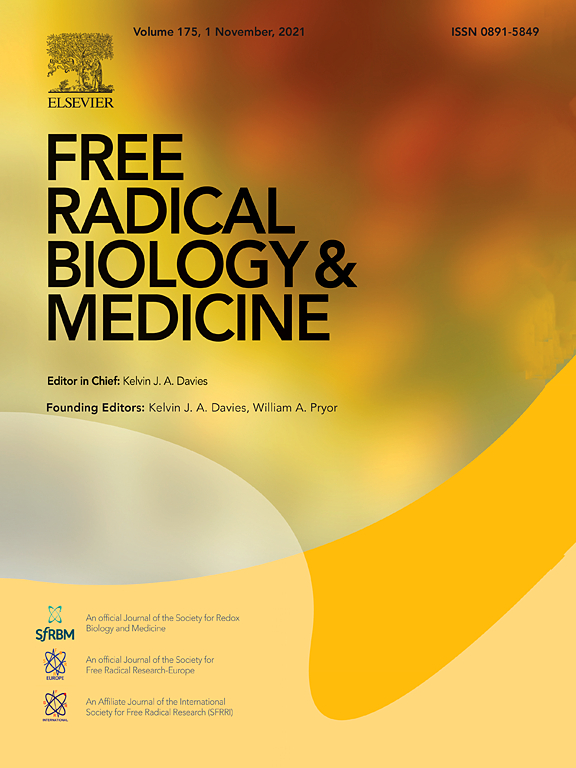
Official Journal of the Society for Free Radical Research – Europe, and the Society for Redox Biology and Medicine.
Free Radical Biology and Medicine | Journal | ScienceDirect.com by Elsevier
The journal, which is published once a month (12 issues), is one of the highest impact factor journals in the field (7.376) and is listed by all the major indexing services, including: Current Contents, Index Medicus, Science Citation, Chemical Abstracts, Current Awareness in Biological Sciences and Toxicology Abstracts.
SFRR-E members with subscription receive access to FRBM on-line: abstracts and full text of all published articles are available to read even before you receive the print issue via mail.
Free Radical Biology and Medicine is the premier forum for publishing groundbreaking research in the redox biology of both health and disease.
We focus on signal transduction and redox signaling; oxidative stress; reductive stress; redox stress; nitrosative stress; aging and age-related diseases; metabolic regulation and metabolic diseases; mitochondrial function and signaling; homeostatic mechanisms and adaptive responses; redox chemistry and mechanisms; materials & nanomaterials; non-thermal plasmas; microorganisms, fungi, plants, insects, animals, and humans; and antioxidant enzymes, pathways, and networks.
We welcome both full-length and short Research Communications, Hypothesis Papers, Reviews, Mini Reviews, Graphical Reviews, and Critical Methods Papers.
Free Radical Biology and Medicine also commissions themed Special Issues aimed at highlighting recent advances in both basic and clinical fields, with a particular focus on mechanisms underlying altered metabolism and redox signaling.
CLICK HERE TO VIEW FORTHCOMING SPECIAL ISSUES
FREE RADICAL BIOLOGY & MEDICINE EDITORIAL BOARD
Editor in Chief
Kelvin J. A. Davies
University of Southern California (USC), Los Angeles, California, United States
Review Editor
Giovanni Mann
Kings College London, London, United Kingdom
Editors
Enrique Cadenas
University of Southern California Department of Pharmacology and Pharmaceutical Sciences, Los Angeles, California, United StatesKate Carroll
The Scripps Research Institute Florida Department of Chemistry, Jupiter, Florida, United States of AmericaChang Chen
Institute of Biophysics Chinese Academy of Sciences, Chaoyang District, ChinaRafael Radi
University of the Republic Uruguay, Montevideo, UruguayShinya Toyokuni
Nagoya University, Nagoya, JapanJosé Viña
University of Valencia, Valencia, SpainHuiyong Yin
Shanghai Institute of Nutrition and Health, Chinese Academy of Sciences, Shanghai, China
Details in relation to open access publication fees can be found on the Elsevier website.
Note that there are substantial discounts on publication fees (of 500 €) for members of the Society for Free Radical Research Europe.
NEW: (27 July 2023) Free Radical Biology & Medicine are inviting Commentaries for submission to a Vitamin E discussion forum. MORE INFO
Redox Biology
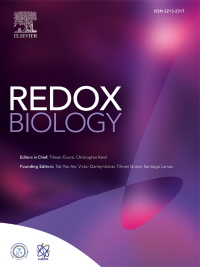
Official Journal of the Society for Free Radical Research – Europe, and the Society for Redox Biology and Medicine.
Redox Biology | Journal | ScienceDirect.com by Elsevier
The Impact Factor of this journal is 12, ranking it 21 out of 297 in BIOCHEMISTRY & MOLECULAR BIOLOGY
With this journal indexed in 6 international databases, your published article can be read and cited by researchers worldwide
Redox Biology is a forum for novel research, methods and review articles in redox biology in the areas of both health and disease. Acceptable paper types are research articles (short or full communications), methods, mini-reviews, and commentaries in the following areas:
Nutrition
Polyphenolics
Cancer
Metabolism
Cardiovascular
Diabetes
Inflammation
Aging
Neuroscience
Cell and Molecular Biology
Cell Signaling
Bioenergetics
Redox Biology will also consider research articles focused in chemical or biochemical mechanisms of redox biology, if these include data demonstrating effects in physiologically relevant models. Studies of uncharacterized complex mixtures of natural products are not a suitable area of focus for the journal. Studies using commercial, undefined kits as the sole or primary assay for redox related changes which are not validated using other methods will not be considered for publication.
Redox Biology introduces Graphical Redox Reviews. These reviews will summarize schematically key concepts, established and novel ideas in redox biology which will be accessible to a broad audience and freely downloaded as PowerPoint slides for use in teaching or conference presentations.
Graphical Redox Reviews ideally should have a format of 3-5 color schemes with a title, short introductory paragraph, extended figure legends, and include up to 20 selected citations.
Editors-in-Chief
Tilman Grune
German Institute of Human Nutrition, Nuthetal, GermanyChristopher Kevil
Louisiana State University (LSU) Health Sciences Center, Shreveport, Louisiana, USA
Editors
Alicia Kowaltowski
University of Sao Paulo, São Paulo, BrazilAnna-Liisa Levonen
University of Eastern Finland A I Virtanen Institute for Molecular Sciences, Kuopio, FinlandFederico V. Pallardo
University of Valencia, Valencia, SpainHong Wang
Lewis Katz School of Medicine at Temple University, Philadelphia, Pennsylvania, United States of America
Review Editors
Lars-Oliver Klotz
Friedrich Schiller University of Jena, Jena, GermanyRakesh Patel
University of Alabama at Birmingham, Birmingham, Alabama, USA
Advances in Redox Research
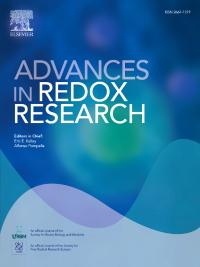 Official Journal of the Society for Free Radical Research – Europe, and the Society for Redox Biology and Medicine.
Official Journal of the Society for Free Radical Research – Europe, and the Society for Redox Biology and Medicine.Web link: https://www.journals.elsevier.com/advances-in-redox-research
Advances in Redox Research is a peer-reviewed interdisciplinary journal which provides a platform for quality original research papers, short communications, invited reviews, and hypothesis papers focused on the broadest range of studies in oxidation-reduction (redox) processes in biology, biological chemistry, and health and disease - if biologically relevant.
Novelty, methodologic accuracy, and soundness of conclusions are indispensable criteria for submission of papers. Confirmative or largely descriptive observations without valid data are not suitable for submission. Studies involving screening of food/plant materials will only be considered if the active component is both identified and quantified.
There are no restrictions on length of articles. The journal aims to provide rapid and helpful peer-review to enable as many investigators as possible to publish their high-quality work.
Editors-in-Chief
- Eric Kelley
West Virginia University Department of Physiology and Pharmacology, Morgantown, West Virginia, United States of America - Alfonso Pompella
University of Pisa Medical School, Pisa, Italy
- Emanuele Albano
University of Eastern Piedmont, Vercelli, Italy - Beatriz Alvarez
Universidad de la Republica Faculty of Medicine, Montevideo, Uruguay - Giuseppina Barrera
University of Turin Department of Clinical and Biological Science, Orbassano, Italy - Silvina Bartesaghi
University of the Republic Uruguay, Montevideo, Uruguay - Garry Buettner
The University of Iowa, Iowa City, Iowa, United States of America - Paul Chantler
West Virginia University, Morgantown, West Virginia, United States of America - Alessandro Corti
University of Pisa, Pisa, Italy - Michael Davies
University of Copenhagen, Copenhagen, Denmark - Rebecca Deegan
University of Nebraska Medical Center, Omaha, Nebraska, United States of America - Irundika Dias
Aston University, Birmingham, United Kingdom - Marc Diederich
Seoul National University College of Pharmacy, Seoul, South Korea - Kimberly Dunham-Snary
Queen's University, Kingston, Ontario, Canada - Paola Gamba
University of Turin, Torino, Italy - Alessandra Gamberucci
Università degli Studi di Siena, Siena SI, Italy - Caroline Gaucher
University of Lorraine, Nancy, France - Lina Ghibelli
University of Rome Tor Vergata, Roma, Italy - Efstathios Gonos
National Hellenic Research Foundation, Athens, Greece - Philip J. Hogg
The University of Sydney, Sydney, New South Wales, Australia - John Hollander
West Virginia University, Morgantown, West Virginia, United States of America - Anthony J. Kettle
University of Otago Christchurch Department of Pathology and Biomedical Science, Christchurch, New Zealand - Nicholas Khoo
University of Pittsburgh Department of Pharmacology and Chemical Biology, Pittsburgh, Pennsylvania, United States of America - Valery Khramtsov
West Virginia University Department of Biochemistry, Morgantown, West Virginia, United States of America - Antonio Martínez Ruiz
University Hospital of the Princess Research Institute, Madrid, Spain - Giorgio Minotti
Campus Bio-Medico University, Roma, Italy - Carola Neumann
University of Pittsburgh, Pittsburgh, Pennsylvania, United States of America - Federico V. Pallardo
University of Valencia, Valencia, Spain - Christopher B. Pattillo
Louisiana State University Health Sciences Center Shreveport Department of Molecular and Cellular Physiology, Shreveport, Louisiana, United States of America - Rafael Radi
University of the Republic Uruguay, Montevideo, Uruguay - Roberta Ricciarelli
University of Genoa Department of Experimental Medicine, Genoa, Italy - Helmut Sies
University Hospital Dusseldorf Institute of Biochemistry and Molecular Biology I, Düsseldorf, Germany - Claudio Sorio
University of Verona, Verona, Italy - Krisztian Stadler
Louisiana State University, Baton Rouge, Louisiana, United States of America - Adam C. Straub
University of Pittsburgh, Pittsburgh, Pennsylvania, United States of America - András Szarka
Budapest University of Technology and Economics, Budapest, Hungary - Dario A. Vitturi
University of Pittsburgh, Pittsburgh, Pennsylvania, United States of America - Roland H. Wenger
University of Zurich, Zurich, Switzerland - Jacek Zielonka
Medical College of Wisconsin, Milwaukee, Wisconsin, United States of America - Matthew Zimmermana
University of Nebraska Medical Center, Omaha, Nebraska, United States of America
Redox Biochemistry and Chemistry
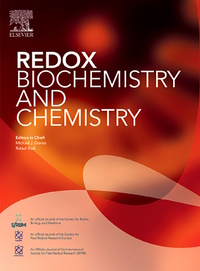
Official Journal of the Society for Free Radical Research – Europe, and the Society for Redox Biology and Medicine.
https://www.sciencedirect.com/journal/redox-biochemistry-and-chemistry
Redox Biochemistry and Chemistry (RBC) is an open access, multidisciplinary platform bridging the fields of redox biochemistry, chemistry, pollution/environmental health research, toxicology and antioxidant mechanisms.
RBC publishes chemistry and biochemistry-based studies on redox reactions involving proteins and components, lipids, cholesterol and cholesterol esters, RNA, DNA and components, carbohydrates and antioxidants, methodologies, and approaches for the detection, identification, characterization and quantitation of redox intermediates and products (e.g. redox probes, kinetics, EPR, MS, CD, fluorimetry, structural biology, computational (bio)chemistry). The Journal welcomes quality original full-length articles, short communications, invited reviews, and hypothesis papers. All submissions are initially assessed by the Editors-in-Chief before being independently peer reviewed by at least two expert referees.
Editors-in-Chief
Michael Davies, DPhil
- University of Copenhagen, København, Denmark
- Protein Oxidation, Extracellular Matrix, Myeloperoxidase, Hypochlorous Acid, Peroxynitrite, Selenium, post-translational modifications
Rafael Radi, MD, PhD
- University of the Republic, Montevideo, Uruguay
- Free radicals, Peroxynitrite, Protein oxidation, Enzymology, Mitochondria
Editorial Board Members
Takaaki Akaike, MD, PhD
- Tohoku University School of Medicine, Sendai, Japan
- Chemical biology and Microbiology
Fernando Antunes, PhD
- University of Lisbon Higher Technical Institute, Lisboa, Portugal
- Quantitative Biology, Kinetics, Mathematical models, Thermodynamics
Elias Arnér, MD, PhD
- Karolinska Institute, Department of Medical Biochemistry and Biophysics, Stockholm, Sweden
- Selenoproteins, Thioredoxin, Redox regulation, Cancer, Biochemistry
Ohara Augusto, PhD
- University of Sao Paulo, SAO PAULO, Brazil
- Redox Biology, Reaction mechanisms, Radical chemistry, EPR spectroscopy, Protein oxidation, Bicarbonate buffer, Carbon dioxide, Oxidants
- University of Buenos Aires, Buenos Aires, Argentina
Krzysztof Bobrowski, Professor
- Institute of Nuclear Chemistry and Technology, Warszawa, Poland
- Physical Chemistry, Radiation Chemistry, Photochemistry, Radical Chemistry, Chemical Kinetics
Steven Bottle, PhD
- Queensland University of Technology, Brisbane, Queensland, Australia
- Radicals, Antioxidants, Oxidation, Fluorescence, Synthesis, Nitroxides, Medicinal Chemistry, Redox chemistry
- The Scripps Research Institute Florida, Department of Chemistry, Jupiter, Florida, United States of America
- Chemical biology
Runwal Centre, PhD
- University of Mumbai, Mumbai, India
- Free radical reactions, redox biology and chemistry of selenium compounds and natural products, nanoformulations
Marcelo Comini, Dr rerum naturarum
- Pasteur Montevideo Institute, Montevideo, Uruguay
- Redox Biochemistry and Biology, Infectious Diseases, Trypanosomiasis and Leishmaniasis, Drug Discovery, Thiol-dependent metabolism
Andreas Daiber, PhD
- University Medical Center of the Johannes Gutenberg University Mainz Center for Cardiology, Mainz, Germany
- Redox biology, vascular biology, cardiovascular disease, oxidative stress, environmental risk factors
- University of Sao Paulo Institute of Chemistry, SAO PAULO, Brazil
- Biochemistry
Emrah Eroglu, PhD
- Sabanci University, İstanbul, Turkey
- genetically encoded biosensors, chemogenetic tools, nitric oxide, Hydrogen peroxide, live-cell imaging, drug screening, vascular biology
Darío Estrín, PhD
- University of Buenos Aires, Faculty of Exact and Natural Sciences, Buenos Aires, Argentina
- Biophysical Chemistry, Computational Chemistry
Cristina M. Furdui, PhD
- Wake Forest University School of Medicine, Winston-Salem, North Carolina, United States of America
- Chemical biology, Enzymology*, Mass Spectrometry, Molecular Probes*, Post-translational modifications*, SILAC, Tyrosine Kinases*, mass spectrometry (MS), chemical modification, mitochondria, enzyme kinetics, redox regulation, cell metabolism, enzyme mechanism, redox signaling, drug resistance, proteomics, antioxidant, cancer, reactive oxygen species (ROS), oxidative stress, Akt PKB, inflammation
Clare Hawkins, PhD
- University of Copenhagen, København, Denmark
- Redox biology, Protein oxidation, Oxidative stress, vascular biology, biochemistry, atherosclerosis, inflammation, immune cells
Neil Hogg, PhD
- Medical College of Wisconsin, Milwaukee, Wisconsin, United States of America
- Nitric Oxide, S-Nitrosothiols, Metabolism, Signaling, Electron Paramagnetic Resonance, photobiomodulation
Chantal Houee-Levin, PhD
- Laboratory of Physical Chemistry Orsay, Orsay, France
- Ionising radiation chemistry and biochemistry, one-electron transfer in biomolecules, oxygen reactive species, free radicals, protein oxidation, NADPH oxidase, neutrophil activation
João A. N. Laranjinha, PhD
- University of Coimbra, Coimbra, Portugal
- The research is focused on the functional impact of nitric oxide in the brain as a neurometabolic regulator and as a mediator of neurovascular coupling with impact in aging and neurodegeneration. We are also interested in dietary nitrite-driven regulatory processes, encompassing the non-enzymatic production of nitric oxide along the nitrate, itrite, O pathway.
Camilo Lopez-Alarcon, Doctor in Chemistry
- Pontifical Catholic University of Chile, Santiago, Chile
- Protein Oxidation, Peptides, Reactive Species
Marisa Medeiros, PhD
- University of Sao Paulo, SAO PAULO, Brazil
- Redox Biology, DNA damage, Lipid per oxidation products
- Joris Messens, PhD
- Structural Biology Research Center, Brussels, Belgium
- Protein biochemistry, Redox biochemistry
Ginger L. Milne, PhD
- Vanderbilt University, Nashville, Tennessee, United States of America
- Lipid oxidation, mass spectrometry, oxidative stress, isoprostanes, prostaglandins, leukotrienes, lipidomics , metabolomics
- Saarland University, Institute for Biochemistry, Saarbrücken, Germany
- Thiol peroxidases, Glutathione, Redox sensors, roGFP2, Redox signalling
Daniel Murgida, PhD
- University of Buenos Aires, Faculty of Exact and Natural Sciences, Buenos Aires, Argentina
- Redox metaloproteins and enzimes, protein electron transfer, cytochromes, peroxidases, copper proteins, Raman spectroscopy, Bioelectrochemistry
Péter Nagy, PhD
- National Institute of Oncology, Budapest, Hungary
- Stoichiometry, sulfur, superoxide ion, redox regulation, peroxiredoxin, thioredoxin, thioredoxin reductase, redox signaling, thiol, cysteine-mediated cross-linking, oxygen radicals, sulfhydryl, hydrogen peroxide, hydrogen sulfide, reactive oxygen species (ROS)
Rakesh Patel
- The University of Alabama at Birmingham, Birmingham, Alabama, United States of America
Marzia Perluigi, PhD
- Sapienza University of Rome, Rome, Italy
- oxidaitve stress, Alzheimer disease, aging, Down Syndrome
Leslie Poole, PhD
- Wake Forest University, Winston-Salem, North Carolina, United States of America
- Cysteine-based peroxidases and their catalytic mechanisms, sulfenic acids in redox regulation and signaling
Christian Schöneich, PhD
- The University of Kansas, Lawrence, Kansas, United States of America
- Pharmaceutical Chemistry, free radical reactions, reactive oxygen species, proteins, reaction mechanisms
Francisco Schopfer, PhD, MBA
- University of Pittsburgh, Department of Pharmacology and Chemical Biology, Pittsburgh, Pennsylvania, United States of America
- Pharmacology, Lipidomics, Lipid oxidation
Hadley Sikes, PhD
- Massachusetts Institute of Technology, Cambridge, Massachusetts, United States of America
- redox metabolism, redox signaling, reaction kinetics, mathematical modeling, biosensors
Corinne Spickett, BA, MA, DPhil
- Aston University, Birmingham, United Kingdom
- Redox biology and biochemistry, lipidomics and lipid oxidation, oxidative post-translational modifications
- Universidad de la República, Montevideo, Uruguay
- Biochemistry, enzymology, antioxidant enzymes, mycobacterium tuberculosis
- The University of Tokyo Graduate School of Agricultural and Life Sciences, Faculty of Agriculture, Department of Applied Biological Chemistry, Bunkyo-Ku, Japan
- Covalent modification of proteins, Lipid per oxidation, Glycation, Antioxidants
Christine Winterbourn, PhD
- University of Otago Christchurch, Department of Pathology and Biomedical Science, Christchurch, New Zealand
- Biological chemistry of reactive oxygen species, Thiol oxidation and redox regulation, Mammalian heme peroxidases, Peroxiredoxins
- Westlake University, Hangzhou, China
- Aminoxy acids as building blocks of foldamores, Oxidation chemistry, Chemical Biology, Fluorescent probes, Molecular imaging
Hui-Yong Yin, PhD
- Shanghai Institute of Nutrition and Health, Chinese Academy of Sciences, Shanghai, China
- Lipid Metabolism, Lipid Peroxidation, Free Radicals, Mass Spectrometry, Metabolomics, Lipidomics, Atherosclerosis, Cancer Metabolism, Liver Cancer, Hyperuricemia, Gout, Metabolic reprogramming
Ari Zeida, PhD
- University of the Republic Uruguay, Montevideo, Uruguay
- Redox Biochemistry, Biophysics, Structural Biology, Theoretical Chemistry
Jacek Zielonka, Ph.D., D.Sc.
- Medical College of Wisconsin, Milwaukee, Wisconsin, United States of America
- ROS detection, Biological chemistry of superoxide, Hydrogen peroxide and peroxynitrite, bioenergetics, Kinetics and chemistry of redox probes
